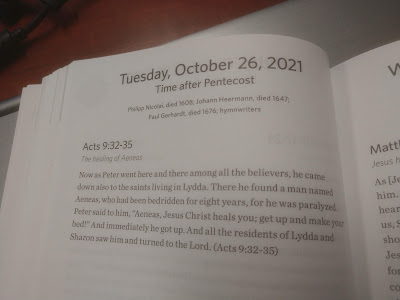Observation: Peter is in Lydda, about 20 miles northwest of Jerusalem. There is already a group of Christ-believers there. Peter speaks to one of them Aeneas, who has been paralyzed for eight years, and tells him "Jesus Christ heals you, get up and make your bed!" This story shows a little of Peter's forceful personality. Jesus in this past Sunday's Gospel lesson began his healing of Bartimaeus by asking, "what do you want me to do for you?" Peter, on the other hand, simply approaches Aeneas and announces that Jesus is healing him, and that's that! Still, when Aeneas is able to get up, everyone present "turns to the Lord."
Application: A Biblical healing story isn't a healing story without the "punch line." In a joke, the punch line is the destination, the make-or-break moment that will tell you if it was worth listening to the joke. The intended result, of course, is that you'll laugh.
The "punch line" of a healing story, however, is not the "laugh line" but the "faith line." A healing story isn't done when a person's ailment has been shown to be gone. What always, always, always follows on its heels is the response of those nearby: awe and faith in God. The punch line of Aeneas' story is the people "see him and turn to God." That's the twofold purpose of healing in the scriptures: yes, Jesus heals simply to alleviate the pain of one individual, but also, Jesus heals to turn people's attention to God.
Today I'm thinking about my own experiences of healing, of new life, and of growth. What are the "punch lines?" What has Jesus done in my life that can cause people to "see and turn to the Lord?" I want to tell my story in such a way that the punch line is not, "Hey, aren't I blessed and lucky that God did this for me?" but rather, "Look at our amazing God, who loves, heals and saves, and can do the same for you!"
[Today is the commemoration of the hymnwriter Paul Gerhardt, so for my prayer I want to share stanza 4 of his hymn, "All My Heart Again Rejoices", ELW #273.]
Prayer: You, my Lord, I'll ever cherish;
though my breath fail in death, I will never perish;
by your side in light eternal
I shall be endlessly filled with joy supernal.
Amen.



